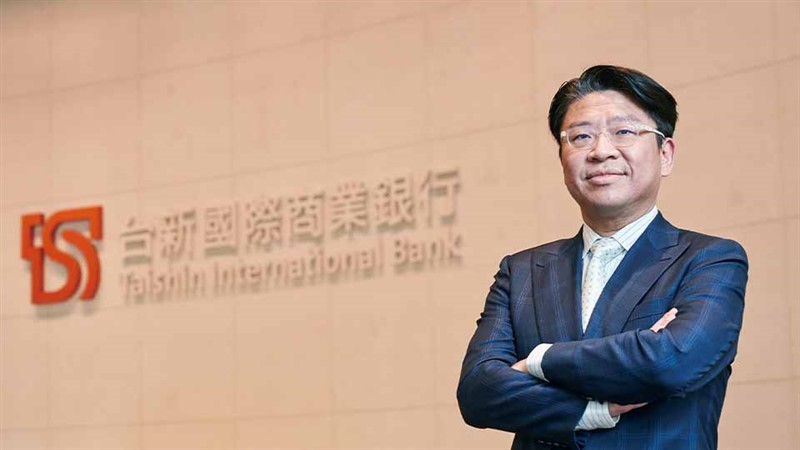2023.04 The Taiwan Banker NO.160 / By Chen Wei-an
Taishin Director of Sustainability Masson Li: Sustainability has become part of Taishin's DNABanker's Digest
"EPS and ESG are two legs. You can't have one long and one short, otherwise you won't be able to run!” Masson Li, who has just taken over as Taishin Financial Holdings’ Director of Sustainability, explained his goals and mission, laying a pragmatic blueprint for Taishin’s ESG development. In the future, Taishin will also select themes to promote, fully focus on the issue of net zero-emission energy, and empower every employee with the sustainability genes. 2022 was an important year for Taishin Financial Holdings. Not only does it mark its 30th anniversary, but it also declared the slogan “serious sustainability.” Taishin has made rapid changes, promoting its Sustainability Committee to the board level, and establishing an Office of Corporate Sustainability to take a broader view of the sustainability transformation for both itself and its customers in urgent response to the climate issue. Taishin continues to participate in important sustainability initiatives in Taiwan and abroad, including the Task Force on Climate-related Financial Disclosures (TCFD), the Equator Principles, due diligence governance codes for institutional investors, and the Principles of Responsible Banking; it incorporates ESG into its investment assessment considerations. In 2021, it was joined the Taiwan Net Zero Emissions Association as a founding member. In July 2022, it became the third company in Taiwan, and the fifth financial institution in Asia, to pass the carbon reduction target audited by the Science-Based Targets initiative (SBTi). Three key sustainability issues Last year, Taishin re-defined its proposition on sustainability as “serious and sustainable green life,” and launched strategic planning focusing on three key issues: climate action, financial co-prosperity, and sustainable empowerment. As Chief Economist, Li led the promotion of sustainable development from an economic perspective. “My view of sustainable development is very different from the larger industry idea,” he said. Li mentioned a more pragmatic view of Taishin's sustainable proposition, emphasizing the inevitable links between sustainability, corporate governance, and maximization of shareholder value. Taishin implements ESG through shareholders and stakeholders in a consistent manner, and not simply for its own sake. He said that this view was first put forward by Paul Hsu, founding dean of the College of Management at National Taiwan University. Li also deeply agrees that companies cannot focus on ESG all the time. They cannot cover all topics related to sustainability, but rather must be selective. “Taiwan’s sustainability is very active, but I still think it should not be overdone.” Taishin hopes to promote the priorities of customers and regulators, with the aim of sharing prosperity with customers. Li further noted that global promotion of net zero sustainability is divided into three scopes in terms of carbon inventories. At present, most attention is paid to Scope III, which concerns nothing less than the supply of electricity. Taishin will first start with electricity, actively seeking pragmatic solutions. It will first solve the issues that customers care the most about, instead of picking too many far-reaching topics at once. ESG has become a top priority in the global fight for net zero, but in the past, the tone was often that without ESG, there will be no EPS. Li said that this is a chicken-and-egg problem. In the past, ESG meant cheaper things, but today, young people have different views on value. Changes in customers prompt changes in banks He gave an example. Buying a bar of soap, consumers used to look at price, but now they look at environmental friendliness. More and more younger people are willing to pay more for green products. This change in customer behavior indirectly affects banks; after the consumer mentality changes, the business environment of the financial industry will also change, i.e. “no ESG, no EPS.” In order to grasp the latest trends, in line with international standards, the Office of Corporate Sustainability refers to international initiatives, regulations, and financial benchmarks. Taishin set its three key sustainability issues after integrating internal and external viewpoints through numerous interviews and discussions with senior executives: climate action, financial co-prosperity, and sustainable empowerment. The first issue integrates climate action into Taishin’s own operation and investment and financing processes, leading credit customers to improve their ability to adapt to climate change. Li pointed out that the Financial Supervisory Committee is very focused on this issue. It has established a sustainable pioneer alliance, and major financial institutions have also incorporated climate action in their TCFD reports. The second issue is financial co-prosperity, using financial technology to establish sustainable partnerships, increase cross-industry cooperation and customer communication, implement inclusive finance, and establish a sustainable financial ecosystem. Li said that Taishin Financial Holding Company is focusing on consumer finance, and hopes to achieve inclusion through fintech. “It’s hard for us to imagine,” Li said, “but if you need for financial services in rural areas, there are probably only post offices left in many areas!” In the future, he says, Taishin will combine ATMs with mobile phones to become simple branches, and later to provide more customized services. He even hopes to use the metaverse concept to meet the needs of face-to-face services, so that people do not have to travel long distances to branches, eliminating 90% of problems in a simple way. The third issue is sustainable empowerment, which introduces sustainability thinking into rewards and talent cultivation, giving senior managers and employees the skills they need for the future. In the past, Li said, Taishin’s DNA only included innovation, but in the future, this will be joined by sustainable development. This is also consistent with Taishin’s slogan of recruiting management associates (MA). Li hopes that every MA will have sustainability genes in their DNA. In addition, Taishin is also starting to emphasize equal rights issues including gender and diversity. In the past, finance was often regarded as the most conservative industry, but now it must move forward. Working together to actively promote a virtuous cycle Following the “green life” slogan in 2022, besides cooperating with charities, Taishin will promote financing for a low-carbon life in 2023, and has achieved considerable results so far. Li mentioned that Taishin does not implement green life by itself, but together with customers. For example, the headquarters have a YouBike stand in front, and Gogoro electric bikes in the back, helping replace grid power. If you become greener, your customers will also be willing to switch to online billing, and Taishin donates the money saved to replace lights in energy-poor households. In addition, Taishin also sponsors charities to plant trees to offset employee emissions from taxis. In the future, there will be new activities every month. “Sustainability is not about setting off fireworks,” he said. Li gets many questions about how he transitioned from an economist and stock market expert into Taishin’s helmsman for sustainability. He calls himself a “minor pioneer in environmental protection,” and hopes that the Office of Corporate Sustainability will become an engine to pass on new concepts and actions, so that employees can also make a difference. “Everyone who studies economics is starting to talk about ESG,” he said. This is the arrogance of economics, thinking that everything in the world falls under its domain. In fact, from Coase’s theorem, any externality can be understood simply by bringing it under a market framework, but ESG has not been marketized in the past, because the costs are internalized, which is also related to disclosure. In the future, ESG will become more market-aligned, and this requires a methodology, which will rely on experts from two fields: economics and accounting. In the future, the Office of Corporate Sustainability will continue to seek experts in accounting, law, and environmental engineering. The key to ESG lies in attitude However, even after setting goals, many other challenges still follow. Li said that the key to ESG promotion lies in attitude – after all, the financial industry is still conservative. In addition to educating customers about ESG, it is also necessary to educate employees. Li believes that all concepts should reflect the principle that the user pays. In the past, no one thought about paying for fresh air, but when the air becomes dirty, it becomes a cost. It is up to corporate decision-making to highlight these costs in each case, but this relies upon education. Li emphasized that in the past, he could only speak on his own, but now that the FSC is constantly advocating for ESG, it has become easier to talk about it with other businesses. Internal education and training have become faster, and employees can also bring it up with customers. Li sees opportunities in overcoming the challenges of sustainable transformation. He pointed out that sustainable investments and bonds have become a focus of the market, and carbon rights have created new securities. Energy investment has already moved from large power plants into renewable energy. Technology is also improving. Academia Sinica developed a methane pyrolysis an efficient natural gas cracking technology, decomposing natural gas into hydrogen and solid carbon, and using the hydrogen to generate electricity. In the past, natural gas had to produce less than 270 grams of carbon dioxide per kilowatt-hour of electricity in order to be considered green. If decarbonization and hydrogen combustion technology can be successfully matched with a cracking efficiency of 30%, the carbon emission coefficient could be reduced to 271.6 grams of carbon dioxide emissions per kilowatt-hour of electricity, almost meeting EU standards to eventually become green natural gas. In addition, energy storage, solar energy, wind power, distributed power generation, and smart grids will all become important topics for corporate finance in the next 5 to 10 years. Nevertheless, Taishin specializes in consumer finance. Li said that Taishin is currently more focused on leading customers to a green life, such as practical measures to encourage cycling to and from work. Regarding the sustainability transformation, Taishin is continuing to advance. With the increasing global attention being paid to climate change, it has gradually deepened its efforts to support related development. In addition to incorporating ESG into its investment and financing evaluation, it is also financing the green energy and environmental protection industry, increasing its allocation in green bonds and sustainability index constituent stocks, and negotiating with customers on net zero carbon reduction. Li emphasizes that Taishin will continue to pay attention to international trends, carefully consider how to reduce its impact on the environment and society through its operations, deepen its promotion and implementation of sustainable finance and climate disclosures, and strive to become a permanent partner of both investment clients and the general public.


